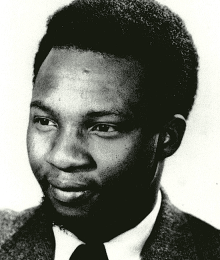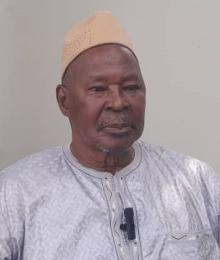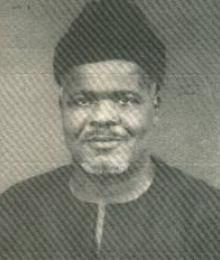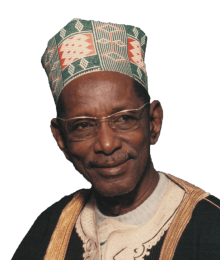
Djibril Tamsir Niane was an eminent Guinean writer, historian and scholar, born in 1932 in Conakry. A well-known specialist in the history of the Malian Empire and the Mandinga civilization, he is best known for his major work "Soundjata or The Mandinga Epic" (1960), which popularized the medieval West African epic of Soundiata Keita, the legendary founder of the Mali Empire in the 13th century.
Figure of the African cultural renaissance, Djibril Tamsir Niane has devoted his life to preserving and promoting the rich oral and historical heritage of the continent, including contributing to UNESCO's General History of Africa. His hard work in collecting the stories of the griots and his extensive literary production have made him an indispensable ambassador of Mandingue memory and traditions.
Introduction
Djibril Tamsir Niane was an eminent Guinean writer, historian and scholar known for his work on the history and oral tradition of the Mali Empire and the Manding people. His major contribution, the book "Soundjata or the Mandinga Epic", published in 1960, brought to the world the medieval West African epic of Soundiata Keita, the founder of the Mali Empire in the 13th century. Considered an African classic, this book has been translated into several languages and is taught in many universities around the world. Djibril Tamsir Niane has dedicated his life to preserving and promoting the cultural and historical heritage of Africa.
Enfance et Éducation
Djibril Tamsir Niane was born on January 9, 1932 in Conakry, Guinea. From a modest family, he grew up in an environment rich in oral traditions and folk tales that nurtured his early interest in African history and culture.
After high school studies in Dakar, Senegal, young Djibril Tamsir Niane went on to pursue graduate studies in history at the University of Bordeaux in France. He graduated in 1959 with a bachelor's degree and a Diploma of Graduate Studies (DES) in his pocket. His memory of DES dealt with the Mali Empire in the Middle Ages, a theme that would become the leading thread of his career as a historian.
Début de Carrière
Returning to Guinea after graduating, Djibril Tamsir Niane began teaching at the Polytechnic Institute of Conakry. Passionate about the history of his country and the Mandé, he continued his research on the epic of Soundjata Keïta by collecting oral accounts from the griots, including Mamadou Kouyaté. It was from this field work that he wrote his major work "Soundjata or L'épopée mandingue" published in 1960 at the editions Presence Africaine in Paris.
Enthusiastic about the construction of the new Guinea state after independence, Djibril Tamsir Niane actively invests in the field of education and historical research. He co-directs with Jean Suret-Canale the first handbook of African history used in African secondary schools.
Exil au Sénégal
Unfortunately, some of his writings deemed too critical of the regime of Sékou Touré earned him imprisonment in 1961. Released in 1964, Djibril Tamsir Niane was forced to exile to Senegal in 1972 where he joined the Fundamental Institute of Black Africa (IFAN) in Dakar as a teacher.
Despite his exile, he tirelessly continued his work of collecting and transcribing the oral narratives of the griots, thereby helping to preserve the rich oral tradition of Africa. He was also invited to teach at Howard University in Washington D.C. and the University of Tokyo as an emeritus professor.
Historien
Together with Joseph Ki-Zerbo, Djibril Tamsir Niane co-directs the publication of Volume IV of the General History of Africa under the auspices of UNESCO, a major contribution to the documentation of the history of the African continent.
His expertise in the Mali Empire and Mandinga civilization made him an international reference. He has published many academic works such as "Researches on the Mali Empire in the Middle Ages" (1975) and "History of the Mandingues of the West". (1989).
Bibliothèque
In the 1990s, Djibril Tamsir Niane opened his personal library rich in thousands of books purchased from all over the world. This place has been a must-see documentation centre for academics and researchers from Guinea and abroad for more than a decade.
Unfortunately, in February 2012, a fire partially devastated the library, destroying valuable manuscripts, research notes and works of art. Despite this tragedy, Djibril Tamsir Niane attempts to reconstruct part of this heritage from the elements saved from the flames.
Œuvre
Beyond his academic work, Djibril Tamsir Niane has also illustrated himself in fiction with news collections such as "Méry" (1975) and "Tales of Yesterday and Today" (1985). He has also written historical plays such as "Sikasso, or The Last Citadel" and "Chaka".
His masterpiece, however, remains "Soundjata or The Mandinga Epic", a true classic of African literature that relates the achievements of Soundiata Keita, a legendary hero at the beginning of the Mali Empire in the 13th century.
Publications
Here is a non-exhaustive list of the main publications by Djibril Tamsir Niane:
- Soundjata ou L'Épopée mandingue (1960)
- Recherches sur l'Empire du Mali au Moyen Âge (1975)
- Méry (recueil de nouvelles, 1975)
- Contes d'Hier et d'Aujourd'hui (1985)
- Histoire des Mandingues de l'Ouest (1989)
- Contributions au volume IV de l'Histoire Générale de l'Afrique (UNESCO, 1991)
- Sikasso, ou La Dernière citadelle (théâtre, 1991)
- Chaka (théâtre, 1991)
- Contes de Guinée (2006)
Prix et Reconnaissances
For his immense contribution to the preservation and promotion of African cultural heritage, Djibril Tamsir Niane has received many awards throughout his career:
- Honorary Member of the Senegal Writers' Association
- Secretary-General of the Leopold Sédar Senghor Foundation
- Honorary Professor, Howard University (Washington D.C., United States)
- Honorary Professor of the University of Tokyo (Japon)
- Yasser Arafat African Grand Prize for Peace and Freedom (2019)
Vie Privée
Djibril Tamsir Niane was the father of five children born from his union with Hadja Aissatou Diallo, from Labé, Guinea:
- Daouda Tamsir Niane, journalist who became the director of the Djibril Tamsit Niane Library
- Katoucha Tamsir Niane, international model died in 2008 after publishing an autobiographical book
- Raliatou "Fifi" Tamsir Niane, actress, director and playwright
- Fatou Tamsir Niane, publisher who worked for the Nouvelles Éditions Ivoiriennes
- Bachir Tamsir Niane, modern literature teacher and writer
In 2021, the life of the illustrious Djibril Tamsir Niane was tragically struck by a painful blow to fate. On 8 March, he died at the age of 89 in Dakar, Senegal, as a result of Covid-19, after being evacuated to receive treatment. Ironically, his twin sister, Yayè Niane, died of the same disease a few hours earlier in Conakry, Guinea.
The disappearance of Djibril Tamsir Niane was welcomed with immense sadness in the African literary and academic world. The work and legacy of one whom the president of the Senegal Writers' Association, Alioune Badara Bèye, described as "the guardian of African memory" were welcomed by many.
Conclusion
The life and work of Djibril Tamsir Niane brilliantly illustrate his mission: to perpetuate the rich oral tradition and historical heritage of West Africa. By collecting and transcribing the epic narratives of the Mandinga griots, in his masterpiece "Soundjata or The Mandinga Epic", he has offered the world an invaluable cultural treasure.
His career as a historian, writer and academic has greatly contributed to bringing out the shadows of medieval African civilization and the recognition of its universal value. Djibril Tamsir Niane will forever remain a leading figure in the African cultural renaissance, a passenger of memory whose footprint remains indelible.
Today, his legacy is perpetuated through the Djibril Tamsir Niane Library located in Conakry, a true haven of knowledge and knowledge that he so cherished. This institution, whose family wishes to see it obtain public interest status, stands as a beacon for future generations of African writers, intellectuals and researchers.






















